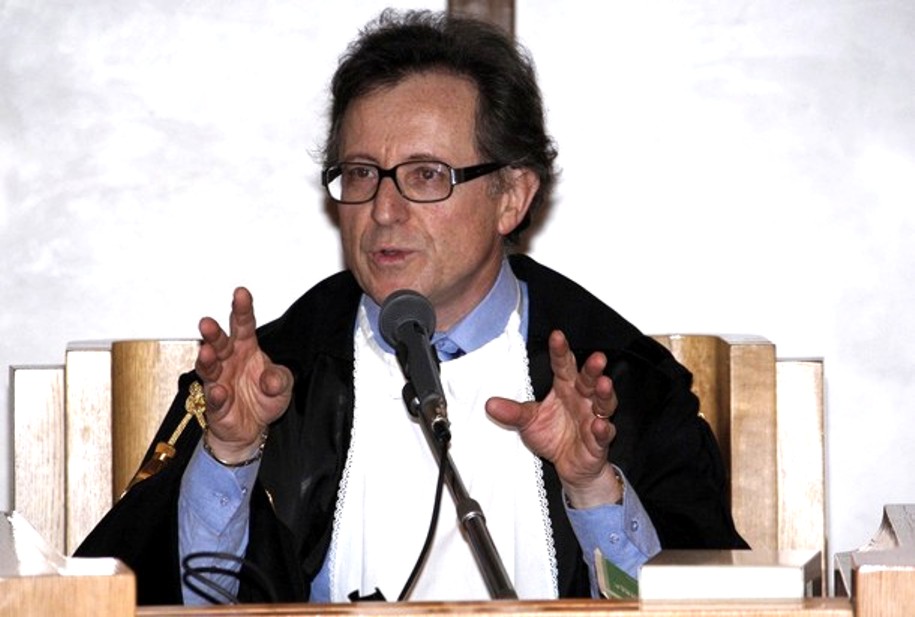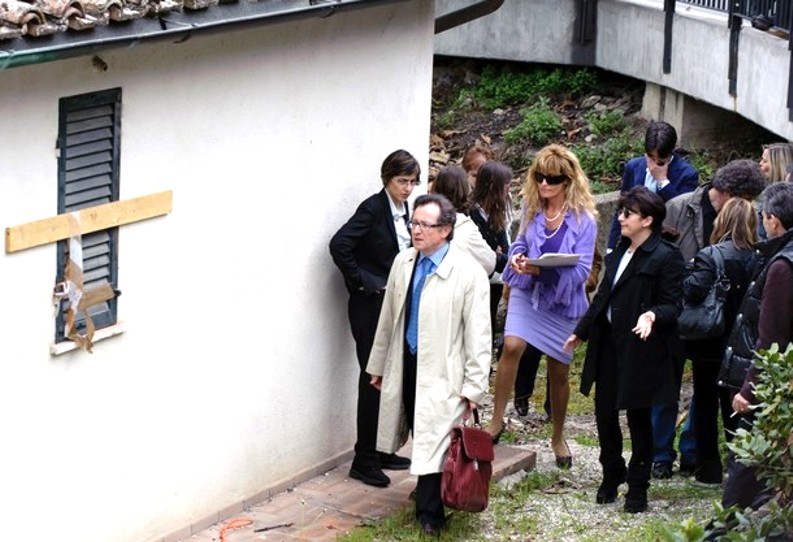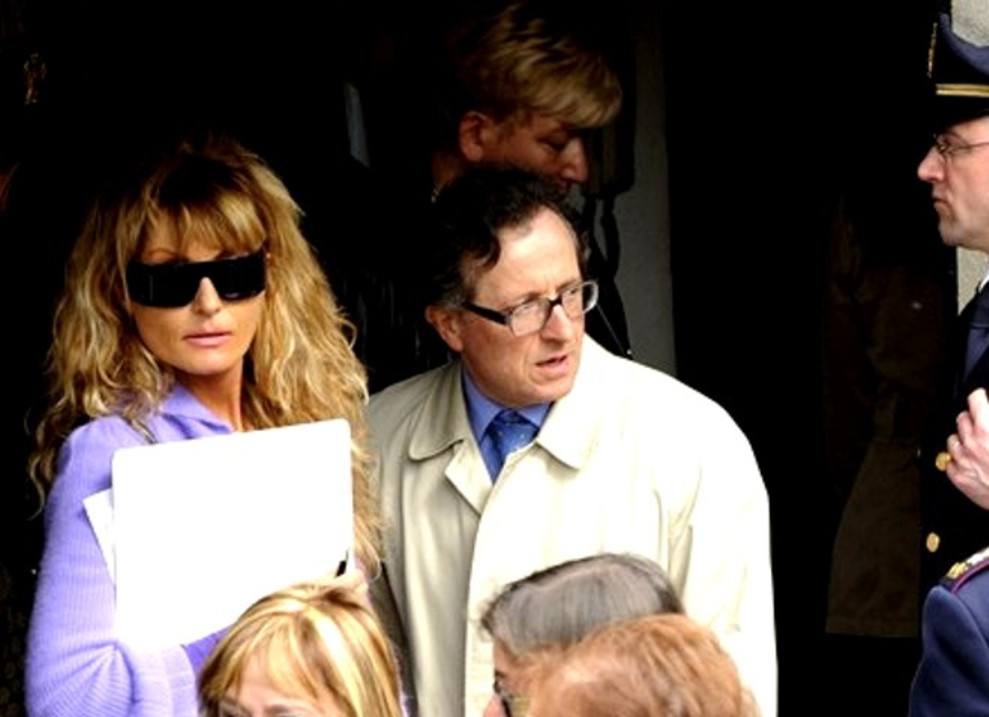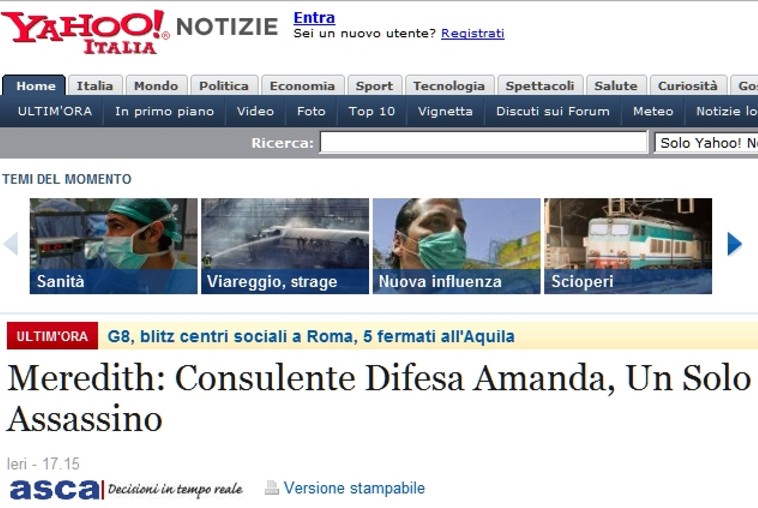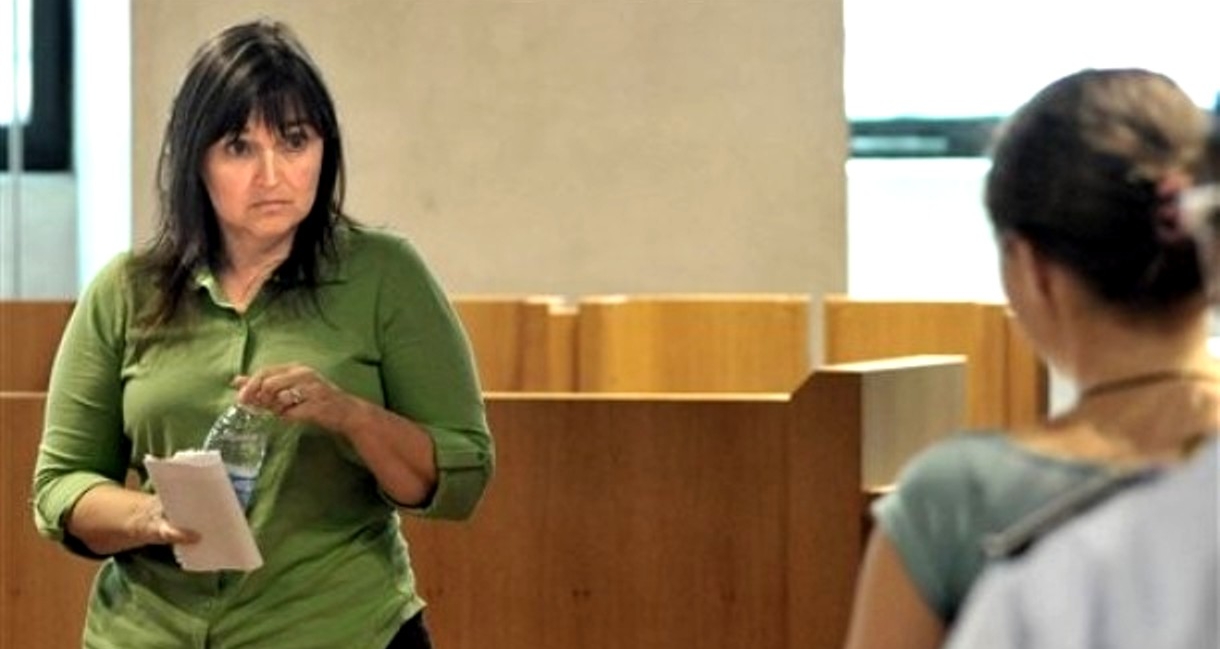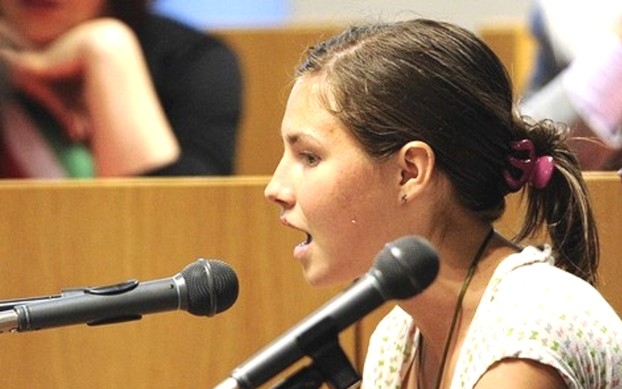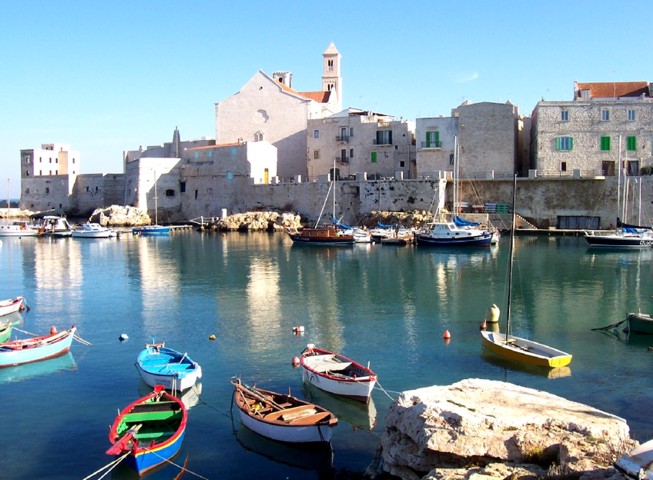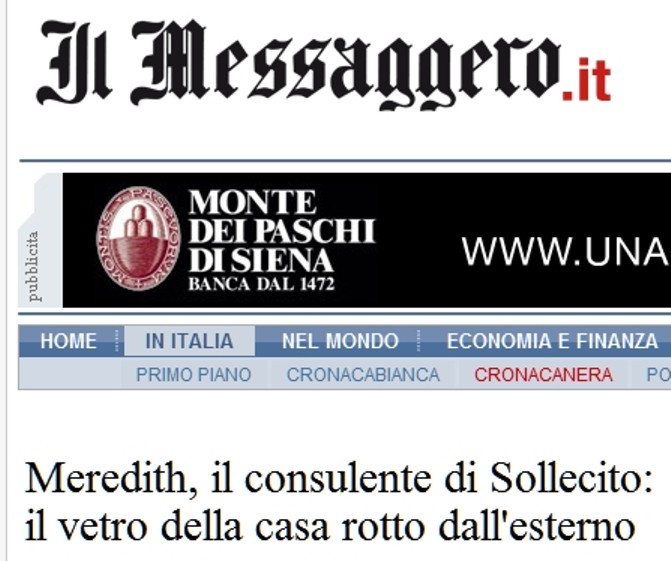
Thursday, July 09, 2009
The Presiding Judge Giancarlo Massei Is Reported To Be Unwell
Posted by Peter Quennell
The kindly but very sharp Judge Massei apparently has contracted pneumonia.
We wish him well. He is winning high praise for conducting a fair and very careful trial.
Court sessions are canceled for the rest of this week, and possibly for next week as well, which would mean the next trial session would be on September 14.
Below: Judge Massei and the jury at Meredith’s house 18 April. And Italy-based Andrea Vogt has a good overview of where things stand in the case right now.
Wednesday, July 08, 2009
The Other Long-Term Shadow That Hangs Over Perugia….
Posted by Peter Quennell
Those beautiful mountains. The Appenines.
As the two main tectonic plates that constitute most of Italy separate out, those mountains - and Perugia - are slowly sinking.
Here is a good short description of the plate tectonics that are involved.
And the earthquakes that result can be real killers. In April, you may recall, over 150 people died in the earthquake around L’Aquila, as the G-8 Summit leaders are now being reminded.
L’Aquila is about a 90-minute drive south-east of Perugia. Things can be done to make old buildings more earthquake-proof, but sadly, the old town of Perugia still runs great risks.
Defense Experts Testimony: Daily Beast Posts The Most Detailed Report In English
Posted by Peter Quennell
Click above for the report by Barbie Nadeau on the disputatious knife and DNA-handling evidence..
[Coroner Torre and genetic expert Gino] testified that “Exhibit 36,” a knife found in Sollecito’s apartment with Knox’s DNA on the handle and Kercher’s on the blade, cannot be the murder weapon. Torre showed pictures of Kercher’s wounds to the jury, then used a mannequin to demonstrate that this knife was too big to make two of the wounds in Kercher’s neck. He conceded that a third larger wound could have been made with the knife, but said it was more likely it was made by twisting a smaller knife….
Although Torre and Gino, who did not examine Kercher’s body, both testified that they saw no evidence that more than one person was involved in her murder, countless prosecution witnesses, including two coroners who did examine Kercher’s body, testified that the 47 cuts and bruises indicated that “more than two hands” were at work.
Tuesday, July 07, 2009
Trial: Italian Reporting On Autopsy Consultant Seems Brief And Unswayed
Posted by Peter Quennell
We had long been led to believe the testimony of Carlos Torre might be a blockbuster which could energize a lackluster defense.
Click above for the longest report of the day that we can find in Italian. Even ASCA’s report seems relatively brief and restrained. No sense of a breakthrough there.
ASCA reports that Mr Torre interpreted the wound pattern on Meredith to mean that a smaller knife was used for the final blow “with a blade of 8 cm which was partially extracted and plunged in at least 3 times”.
As the size of the wound is large, he claimed a repeated partial in-out action of the small knife, rather than blows from the larger kitchen knife with a blade of 16 cm found in the kitchen of Sollecito, on which traces of the DNA of both Meredith and Amanda Knox were found.
Also that the final blow occurred while Meredith was lying on her back, that there were no signs of three aggressors, that Meredith could not have cried out after the stab wounds, and that bloody footprints revealed under luminol were not the shape of Knox’s foot.
Mr Torre conceded under cross-examination that a wound of the size of the larger knife was also present, and he left the DNA evidence of Knox and Meredith on that larger knife unchallenged, thus undercutting his claim of a single perpetrator.
The prosecution team had presented extensive evidence that the bruise patterns and cut marks indicated that Meredith was kneeling face-down at the time. And that they all pointed to three attackers, rather than a single attacker wielding two knives with only one hand free both to hold her and to inflict bruises all over her body.
Judge Micheli in seeing most of the same evidence concluded in his report convicting Guede and sending the two to trial that a scream heard by witnesses in the houses above was probably Meredith’s last act before she was stabbed, not right after.
And last month, Sollecito’s defense team essentially went along with the prosecution experts’ claims for the autopsy and attack scenario, so for the first time the defense teams significantly differ.
Thankfully, besides being terse, the reporting was not very graphic, in this the most painful of all areas for those who mourn Meredith the most.
Sunday, July 05, 2009
Why Defendants Mostly DONT Testify? Those Devils That Lurk In The Details
Posted by FinnMacCool
Preamble
We have always pressed very hard for the truth to come out. WHY did poor Meredith have to die? And why and how in such a cruel and depraved way?
It now looks almost overwhelmingly certain that the truth did NOT come out when Amanda Knox took the witness stand in the court on 12 and 13 June.
No media organization seems to have made even the slightest effort to analyze Amanda Knox’s testimony, to see if it hangs true with past statements and known timelines.
But the judges and jury will do this for sure.
We have also begun to cross-check the testimony, and the first results look quite devastating for the defense.
1. A phone call before dawn
The phone is ringing in Seattle. Edda Mellas wakes up - it is long before dawn, on a Friday morning early in November. (To be precise, it is 0447 on November 2, 2007.)
Her daughter is calling from Italy - Amanda doesn’t usually call at this hour, she’s usually more careful about time zones.
Speaking to ABC’s 20/20 show a few weeks later, Edda described the content of that call as follows:
[Amanda] goes, “I’m back at my house, and I want you… first I know I’m okay.” And I said, “Okay, you know, what’s goin’ on?” And she said, “Well, I was at Rafael’s last night… and I’ve come home now and I think somebody’s been in my house…” And she told me, “We can’t find Meredith. We can’t get a hold of Meredith. And her room is locked.” And I said, “Hang up and call the police.”
Phone records show that the call lasted a minute and a half. Amanda is concerned enough to wake her mother before five in the morning. First, she reassures her mother that she herself is okay. She explains what will later become her alibi for the murder of Meredith Kercher - that she spent the night at Raffaele Sollecito’s apartment.
Then she explains why she is calling in the middle of the night - there are signs that someone has been in the house, that Meredith’s door is locked, and that she and Raffaele have been unable to make contact with Meredith.
Edda’s reply is simple, and plainly it is good advice: hang up, and call the police.
Phone records show that a minute and a half after this call ended (at 1250) Raffaele made a call to his sister Vanessa, who is a lieutenant in the carabinieri.
We don’t have too much detail about the content of this call (since Vanessa hasn’t testified and Raffaele is exercising his right to silence) except that it appears to have been similar to Amanda’s call to her mother. Raffaele briefly explains the problem at the cottage and Vanessa advises him to call the police.
A minute later, Raffaele calls the police. After a phone problem - he has to call back after being placed indefinitely on hold - he calls them a second time and explains the problem. Since these calls were recorded, we know exactly what was said.
Raffaele claims that someone has broken into the house through a broken window and caused a lot of disorder. There is a lot of blood, but nothing has been stolen, and the main problem - as he sees it - is that there is a locked door. The police say that they will send a patrol to verify the situation.
Edda’s testimony, supported by the police and phone records, shows a straightforward link from the call she received at 0447 Seattle time (1247 in Perugia) to the calls that Raffaele makes to his sister (1250) and the police (1251 and 1254). That whole process takes just eight minutes.
At 0524 (1324 in Perugia), Edda receives a second phone call from her daughter. Amanda explains that the police have now arrived and found Meredith’s dead body.
2. Two days later: an email
The murder makes the international news. Several phone calls follow. Over the weekend, Amanda is one of several people being interviewed by the police, alongside others who knew Meredith, or who arrived at the crime scene before the discovery of the body.
At home in Seattle on Sunday, Edda Mellas receives an email from her daughter, which is copied to multiple recipients (friends, family, and staff at the University of Washington).
Amanda describes how, on the Friday morning, she went home, showered, noticed some problems, returned to Raffaele’s apartment, went back to the cottage with Raffaele, and became increasingly alarmed about the various signs that an intruder had been in the house.
Then there is a part that Edda finds strange. Amanda describes the following events, as regards calling the police:
“in the living room raffael told me he wanted to see if he could break down merediths door. he tried, and cracked the door, but we couldnt open it. it was then that we decided to call the cops. there are two types of cops in italy, carbanieri (local, dealing with traffic and domestic calls) and the police investigaters. he first called his sister for advice and then called the carbanieri. i then called filomna who said she would be on her way home immediately. while we were waiting, two ununiformed police investigaters came to our house.
Something is missing from this account. There is no mention at all of the pre-dawn call that Amanda made to her mother - the one in which Edda herself told Amanda to call the police. Naturally Edda trusts her daughter. But there is something about this part of the email that troubles her, because it doesn’t square with her own memory of what had happened on Friday morning.
3. The next weekend: visiting Amanda in prison
Edda decides to travel to Perugia to support her daughter in the aftermath of her housemate’s murder. She leaves Seattle on Monday, November 5, planning to meet Amanda in Perugia first thing on Tuesday morning.
However, by the time Edda arrives, Amanda has already been arrested on suspicion of involvement in the murder of Meredith Kercher.
In fact, it seems that Amanda has accused a local man, Patrick Lumumba, of committing the crime, while she herself was in the kitchen of the cottage, covering her ears so as not to hear Meredith’s screams.
Amanda has also written a subsequent document in which she partly stands by this accusation and partly withdraws it, claiming that it now seems “less real” than her previous statement that she spent the night of the murder at Raffaele’s apartment.
Although she has never been to Italy before, Edda does have some contacts in Perugia, since the town is twinned with Seattle. These contacts advise Edda about finding a lawyer for Amanda, so that she can dismiss the court-appointed attorney and appoint a local lawyer (Lucian Ghirga) who remains Amanda’s legal representative to this day.
Mr Ghirga explains the difficulties of Amanda’s having told several versions of events, and advises specifically of the dangers of accusing an innocent man. He hopes that Edda will be able to help Amanda resolve these difficulties, and to tell the clear truth about what happened.
On Friday, November 10, Judge Claudia Matteini finds sufficient grounds for continuing to hold all three suspects (Raffaele Sollecito, Amanda Knox and Patrick Lumumba) pending further investigation.
On Saturday, November 11, Edda Mellas visits her daughter in jail. It is now eight days since Edda received that phone call before dawn in Seattle.
One of the points she wants to help Amanda resolve is that puzzling omission from the email of the pre-dawn phone call. How could it be that Amanda has forgotten making that call? Here is a transcript of the conversation between Edda and Amanda about that pre-dawn call:
Edda (surprised): But you called me three times.
Amanda: Oh, I don’t remember that.
Edda: Okay, you called me first to tell me about some things that had shocked you. But this happened before anything really happened in the house.
Amanda: I know I was making calls. I remember calling Filomena, but I really don’t remember calling anyone else. I just don’t remember having called you.
Edda: Why would that be? Stress, you think?
Amanda: Maybe because so many things were happening at once.
Edda: Okay, right.
4. “I really don’t remember this phone call”
Edda is not the only one who finds it surprising that Amanda could simply forget making the call.
Judging from the records, and from Edda’s testimony, that forgotten call appears to have triggered Raffaele’s calls to the police.
Prosecutor Manuela Comodi focused specifically on this point when questioning Amanda in court on June 13, 2009.
Initially, Amanda claimed that she was still unable to remember having made the pre-dawn phone call. She reported that the first call she remembered making was the one at 1324 (0524 in Seattle), which followed up the forgotten call with an account of how the police had arrived and had now found Meredith’s body.
Comodi: You said that you called your mother on the morning of Nov 2.
Amanda: Yes.
Comodi: When did you call her for the first time?
Amanda: The first time was right away after they had sent us out of the house. I was like this. I sat on the ground, and I called my mother. (Note: This is the 1324 call.)
Comodi: So this was when either the police or the carabinieri had already intervened.
Amanda: It was after they had broken down the door and sent us outside. I don’t know what kind of police it was, but it was the ones who arrived first. Later, many other people arrived.
It’s hard to know what to make of Amanda’s account here. It’s one thing to have forgotten making that pre-dawn phone call. But Amanda is now expecting the court to believe that she has also forgotten this prison conversation with her mother, along with the suggested reason (“stress”) for forgetting the call.
As Comodi presses her further about this phone call, Amanda’s only response is that she simply doesn’t remember making it.
Comodi: But from the records, we see that you called your mother - not only from the billing records but also from the cell phone pings - that you first called your mother at twelve. (Note: this is the 1247 call - actually much later than 1200.) At midday. What time is it at midday? What time is it in Seattle, if in Perugia it is midday?
Amanda: In Seattle it’s morning. It’s a nine hour difference, so, ah, three in the morning.
Comodi: Three o’clock in the morning?
Amanda: Yes.
Comodi: So your mother would certainly have been sleeping.
Amanda: Yes.
(Note: because of a difference in when Daylight Savings Times changes, the actual difference on November 2, 2007, would have been just eight hours. Midday would be four o’clock in Seattle. 1247 in Perugia would be 0447 in Seattle.)
There is imprecision both from Comodi and from Amanda with regard to the pre-dawn phone call. The call was not made at midday in Perugia, but at 1247. The gap between Seattle and Perugia was in fact - unusually - only eight hours during that particular week.
The prosecutor is drawing attention to the earliness of the hour - or at least, the earliness of the hour as Amanda understood it to be. 0447 is getting close to a time when it might be acceptable to call an early riser, whereas 0300 certainly isn’t. Perhaps this is the reason for Comodi’s allowing the time to shift earlier at this point in the conversation.
The next section of dialog makes it clear that Comodi’s main aim in this line of questioning is to establish what was Amanda’s motive in making this call.
It’s one thing to call your mother in the middle of the night because the police have just discovered a dead body in your house. But it’s another thing entirely to call your mother at three in the morning because you think there might have been a break-in at your house the previous night.
The obvious implicit question here is: “Why call your mother, who’s fast asleep on the other side of the world, before you’ve even called the police?”
There are credible answers that an innocent person might provide to this question - for example, by claiming that she was faraway, in a foreign country, and she just wanted to hear a friendly, comforting voice.
But Amanda doesn’t say anything of the kind. Instead, she anticipates and wards off the question, by insisting that she simply has no memory of making the call in the first place.
Comodi: “But at twelve o’clock, nothing had happened yet. That’s what your mother said….”
Amanda: “....I told my mother….”
Comodi: “....during the conversation you had with her in prison. Even your mother was amazed that you called her at midday, which was three or four o’clock in the morning in Seattle, to tell her that nothing had happened.
Amanda: I didn’t know what had happened. I just called my mother to say that [the police] had sent us out of the house, and that I had heard something said about…
Comodi: But at midday nothing had happened yet in the sense that the door had not been broken down yet.
It’s worth noting here that, although Amanda has estimated midday as 0300 in Seattle, Comodi silently corrects her by saying “0300 or 0400”. Comodi knows perfectly well that the difference in Daylight Savings Times affected the time difference.
But the prosecutor’s intention is to clarify why Amanda made that phone call to her mother, not when she made it.
We’ve seen that, in Amanda’s email, she claimed that she and Raffaele had reached a point where they had decided they would have to call the police. In the courtroom, Amanda sticks to that story.
But the cellphone records show that before Raffaele called the police, Amanda called her mother in Seattle. Comodi wants to know why she did that.
In the following brief exchange, Amanda repeats five times that she cannot remember making that call.
Amanda: Hm. Okay. I don’t remember that phone call. I remember that I called her to tell her what we had heard about a foot. Maybe I did call before, but I don’t remember it.
Comodi: But if you called her before, why did you do it?
Amanda: I don’t remember, but if I did it, I would have called to…
Comodi: You did it.
Amanda: Okay, that’s fine. But I don’t remember it. I don’t remember that phone call.
In the above exchange, Amanda sounds irritated (“okay, va bene”) to be reminded of this phone call, and insists that she simply doesn’t remember it.
For her part, Comodi reminds Amanda that this is not a “he said/she said” scenario. (“Lo ha fatto.” “You did it.”) There is no possibility of denying that the call took place. This is a phone call that is recorded on the billing records and by the cellphone pings.
5. Why is this phone call important?
We might wonder about why it is important whether or not Amanda could remember calling her mother at 1247, before the body was discovered.
It’s important because that police records show that the communications police had already arrived at the house, and had spoken to Amanda and Raffaele, at the point when this phone call was made.
What really happened during those few minutes appears to be as follows.
- CCTV footage in the car park shows a black Fiat Punto (the same as the model driven by the policemen) arriving at 1225. The police themselves recorded their arrival at the cottage at 1230.
- Filomena calls Amanda at 1234 - Amanda doesn’t mention that the police are already there, but she does say (for the first time) that a window is broken in Filomena’s room.
- Filomena then calls her boyfriend, Marco, and asks him to go to the cottage, because she knows that he will be able to get there more quickly than herself.
- Marco and his friend Luca arrive at the cottage and find that the police are already there, that they have spoken to Amanda and Raffaele and that Amanda has written down some phone numbers.
- Raffaele and Amanda then go into Amanda’s bedroom. A few minutes later, Filomena herself arrives, with her friend Paola Grande. Paola testified that she saw Raffaele and Amanda emerging from Amanda’s bedroom just before one o’clock.
- It would appear that Amanda and Raffaele went into Amanda’s bedroom at around 1247 and made four phone calls: the first to Edda Mellas, the second to Vanessa, and the third and fourth to the police. In other words, while Luca and Marco were talking to the communications police, Amanda went into the bedroom and phoned Edda Mellas.
The explanation Amanda gave her mother as the reason why she forgot the call was that there were so many things happening at that moment. And in fact, there would appear from this reconstruction of events that in reality there were a lot of things happening at once.
But in Amanda’s own version (given in her email) she claims that there actually weren’t many things happening at that point. There were just two people in the house - herself and Raffaele. She claims the police arrived later, after Raffaele dialled 112, and Marco and Luca arrived later still.
In other words, at this point - when Amanda and Raffaele’s version conflicts with the testimony of the other witnesses, with the phone records, with the police records, with the CCTV footage from the car park, and even with the testimony of Amanda’s own mother - they need some kind of coherent story.
Raffaele has exercised his right to silence.
Amanda claims she can’t remember the phone call she made to her mother. And the reason she gives for not remembering the phone call contradicts her own story about what was happening at the time.
6. Judge Massei intervenes
At this point in the trial, the chair of the panel of judges decides to intervene.
He picks up on the issue of the forgotten phone call. He is concerned that Amanda is suggesting that maybe the phone call did not even take place, when in fact it is quite plain that it did.
Politely, he interrupts this part of the questioning.
Massei: Excuse me. You might not remember it, but the Public Minister [prosecutor] has just pointed out to you a phone call that your mother received in the small hours.
Commodi: At three o’clock in the morning.
Massei: So, that must be true. That did happen. Were you in the habit of calling her at such an hour? Did you do this on other occasions? At midday in Italy, which corresponds in Seattle to a time when… It’s just that we don’t usually call each other in the middle of the night.
Amanda: Yes, yes, that’s true.
Massei: So either you had a particular reason on that occasion, or else it was a routine. This is what the Public Minister is referring to.
Amanda: Yes. Well, since I don’t remember this phone call, although I do remember the one I made later, ah. But. Obviously I made that phone call. So, if I made that phone call, it’s because I had, or thought that I had, something I had to tell her. Maybe I thought even then that there was something strange, because at that moment, when I’d gone to Raffaele’s place, I did think there was something strange, but I didn’t know what to think. But I really don’t remember this phone call, so I can’t say for sure why. But I suppose it was because I came home and the door was open, and so for me….
Even to the chair of judges, in other words, Amanda continues to insist that she cannot recall making the phone call that looks to have triggered the self-incriminating 112 calls.
A neutral observer might think of those phone calls as a botched attempt to gather more witnesses to their having innocently stumbled upon the crime scene and then called the police.
The phone records show that Amanda had made one phone call to Filomena (at 1208) before the arrival of the police, and three calls to Meredith Kercher’s phones (at 1207, 1211 and again at 1211). (Amanda claimed that Meredith’s Italian phone “just rang and rang” - but phone records show that it rang for just three seconds.)
So, if it were not that Amanda was trying to strengthen her alibi, and gain another witness to her having innocently stumbled across the crime scene, why exactly did she call her mother?
Amanda’s answer is, “I don’t remember this phone call, so I can’t say for sure why.”
7. Edda Mellas’s testimony in court
On June 19, a week after Amanda had testified, Edda Mellas provided a much fuller version of the phone call that Amanda had unfortunately forgotten.
Edda provided far more detail than she had provided to the ABC 20/20 show. The Seattle TV station, Kiro TV, summarized her evidence as follows:
- In the first phone call, Amanda said, “I know it’s early,” but she called because she felt someone had been in her house. She had spent the night at Raf’s. She came back to have a shower and the main door was open. She thought it was odd but it has a funny lock and it did not close well.
- She went to have a shower and when she came out she noticed some blood but she thought maybe someone had her menstrual cycle and did not clean afterwards. She then went to her room and then went to the other bathroom to dry her hair and saw there were feces in the toilet. Amanda thought that was strange because normally girls flushed the toilet.
- She went back to Raf’s and told him about the things she found strange. Sometime later she got hold of one of the other roommates. She tried to call Meredith several times but there was no answer.
- They came back to the house and she showed Raf what she found and then they also noticed the broken window. And now they were pounding on Meredith’s room trying to wake her.
Edda had provided so much detail that she was asked to confirm whether all this information was indeed in the first call. She confirmed that it was:
Yes, [Amanda spoke] very quickly. I told her to call the police. She said Raf was finishing a call with his sister and then was going to call police. This was the first call.
This first call lasted just 88 seconds, so Amanda must have spoken very quickly indeed….
Edda has also managed to answer the question that her daughter failed to answer the previous week, about why she had called her mother at such an unearthly hour: “Amanda said I know it’s early but she called because she felt someone had been in her house.”
If we accept Edda Mellas’s testimony at face value, we find ourselves wondering how a person who could have crammed so much detail into a phone call could possibly forget making that phone call at all?
We notice also that Edda has confirmed once again that she did advise her daughter to call the police. (And we know that her daughter’s boyfriend did exactly that, shortly after Amanda put the phone down.) Yet Amanda claims that she cannot remember that advice, nor can she even remember making the phone call.
At the end of her written document on November 6, Amanda wrote:
“All I know is that I didn’t kill Meredith, and so I have nothing but lies to be afraid of.”
As the trial progresses, it looks increasingly as though Amanda was indeed involved in the killing of Meredith Kercher - and she has nothing but lies to protect her.
Sources:
1. 20/20 transcript of interview with Edda Mellas published in the Seattle Times for February 2, 2008:
2. Recording and transcript of Raffaele Sollecito’s second 112 call.
3. Transcript of Amanda Knox’s email to multiple recipients on November 4, 2007:
4. Cellphone records for Raffaele Sollecito and Amanda Knox for November 1 and 2, 2007 (case files)
5. Transcript of conversation between Edda Mellas and Amanda Knox on November 11, 2007, cited in court on June 13, 2009
6. Transcript of Edda Mellas’s testimony in court, June 19, 2009
Saturday, July 04, 2009
Trial: Testimony Of Sollecito’s Childhod Friends From Giovinazzo
Posted by Peter Quennell
The defense DNA experts Carlo Torre and Gino Sara have been postponed into next week.
Testifying today instead were five friends of Sollecito’s. He was born in Giovinazzo on the flat and underpopulated south-eastern coast. Giovinazzo (images) is just north of Bari, where his father practices medicine.
Four childhood friends from there testified along with one who knew him in Perugia. Some translated excerpts:
Raffaele is a romantic, shy, kind, and always available, and honest with everyone…. The television described him as a womanizer, in fact he was shy and introverted.
He typically carries a knife in his pocket. For him it was a decorative object to be matched to his clothes. He was once wrapped in toilet paper with a meat cleaver and photographed for a joke.
He occasionally smoked a joint, but was not a habitual consumer of hashish, and would not use other drugs. The joints had a sedative effect and made him want to sleep,
Concerning his first sexual intercourse, he had told one of his friends he had been with a girl from Brindisi who lived in Perugia in 2004 or 2005.
Sollecito then issued a correction. “It was actually in 2007” he said through his lawyer.
The civil lawyer for the Kercher family, Francesco Maresca, made it clear that he was skeptical of much of the testimony.
Perhaps with good reason. Sollecito wrote in his occasional newspaper column in Bari that he was a virgin when he met Amanda Knox.
Trial: The Two Defendants Arrive For Another Day In Court
Posted by Peter Quennell
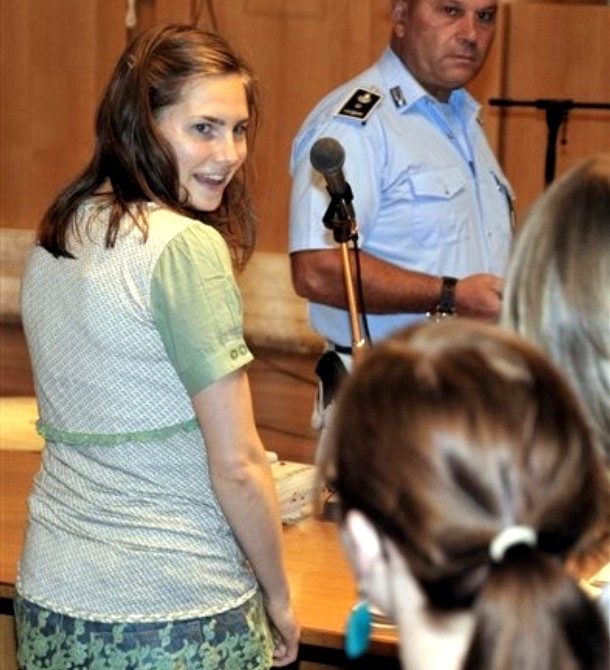
[courtesy AP; click for larger image]
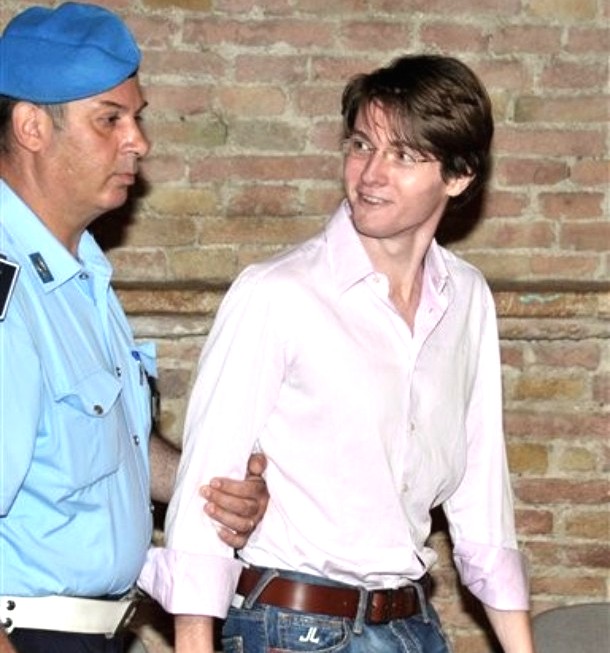
[courtesy AP: click for larger image]
Trial: ABC News Reports On The Trial Happenings On Friday
Posted by Peter Quennell
1. Overview
Click above for Rome-based Ann Wise’s report on what happened in court today.
2. Defense Witness Demonstrates Breaking Windows
Prosecutors say Knox and Sollecito staged a break-in to make the murder appear to be the result of a botched theft. A window in the bedroom of Filomena Romanelli, Knox and Kercher’s housemate, was broken, and glass shards and a 9-pound rock were found in the room.
The prosecution presented witnesses and evidence that suggest the window was broken from the inside.
Francesco Pasquali, a retired forensic police officer hired as a consultant by Sollecito’s defense, presented a video in court that included three different scenarios showing how the rock could have been thrown from the outside to break the window, located 13 feet off the ground.
According to Pasquali, the rock was thrown from a terrace across from the window, making the glass “explode” on the inside and spreading glass fragments everywhere on the inside and the outside of the windowsill.
Pasquali said that he had re-created the same conditions that were found in Romanelli’s room at the time of the break-in. Pasquali said he constructed a window of the same size, with the same paint and the same type of glass, and threw the rock through it into a room with the same characteristics as Romanelli’s room. Two video cameras—one inside and one outside—filmed the rock being thrown through the glass.
By analyzing the trajectory of the rock and the projection of the glass shards, Pasquali said he could “exclude that the glass could have been broken from the inside.”
3. But Pasquali Has To Back Down
Prosecutors, however, contend that shutters outside the window could have prevented a rock from breaking it….
The two prosecutors in the case, Giuliano Mignini and Manuela Comodi, made a number of objections when they cross-questioned Pasquali, who admitted that he had not taken into account the fact that there were shutters on the outside of the original window.
Prosecution witnesses have testified that the shutters were partially closed on the morning after the murder, and Pasquali conceded that the closed shutters would have prevented a rock from the breaking the window from the outside.
“It does not take a technician,” Pasquali said. “If the shutters were ajar then the rock couldn’t fit through.”
As we mentioned earlier, the prosecutors also got Pasquali to admit that, besides omitting those shutters, he had also omitted the mostly-drawn curtains in his simulation.
They could have radically altered the broken-glass pattern.
4. ATM withdrawal from Meredith’s bank account
The director of a local bank, Paolo Fazi, testified that 20 euros ($28) had been withdrawn from Meredith Kercher’s account Nov. 2—the day her body was found.
But he also said that the bank accounting date does not necessarily reflect the actual date of the ATM withdrawal, and that only Kercher’s British bank would have that date.
Someone from the British bank is expected to testify in upcoming hearings. Knox and Sollecito are… accused of stealing Kercher’s credit cards, her cell phones and 300 euros ($420) in cash…
5. Guede at disco early AM
A University of Perugia student told the Perugia court that he had seen Guede at a local disco in the early morning hours of Nov. 3, after Kercher’s murder.
Pietro Camplongo said Guede was dancing alone, and that people were keeping their distance from him, because he smelled “as if he hadn’t washed.”
6. Amanda Knox family in court
[Knox during a break] graciously accepted a chocolate from Sollecito, thanking him out loud. It is reportedly the second time he has given her a chocolate.
Knox’s younger sister, Deanna, 20, appeared in court for the first time on Friday, along with Knox’s mother, Edda Mellas… Deanna Knox had been to Perugia and visited Knox in jail, but she had not returned since the trial started in January.
Knox’s half-sister Ashley, 13, also came to court Friday morning but was asked to leave by the judge, because she is a minor.
Trial: Sky News Italy Report In Italian
Posted by Peter Quennell
As always with the Italian reports we see, a fast, precise, fair, and very accurate report
This Sky TV report provides the main facts of Meredith’s murder, and an accurate summary in half a dozen sentences of what happened in court yesterday.
These videos are always worth a look for the new visuals, even if one lacks the Italian to understand them.
Friday, July 03, 2009
Trial: Prosecution Giving Defense Expert Hard Time Over Guede Break-in Theory
Posted by Peter Quennell
Italian media are reporting on a tough cross-examination of a defense expert this morning.
Francesco Pasquali, a former marshall, showed a video to the court, with three simulations of a large rock being thrown through Filomena’s window, and a theory of how a burglar could have scaled the 4-meter wall and entered the room through the window, leaving no body evidence or any blood where the glass was broken.
For the experiment, the consultant explained, a window and bedroom similar to those of the house (same size, same material and same paint) were constructed. Shots were made with two cameras, one external and one internal to the room, which is in same size and the same decor as Ms Romanelli’s….
The prosecution, represented by Giuliano Mignini and Manuela Comodi, presented a number of objections to the thesis of the expert, such as that in the reconstruction of the events the presence of curtains on the window were not taken into account.
The curtains would have presumably stopped any glass fragments from flying into the room.
It is also being remarked that the defense has not, either for-real or in today’s simulation, had anyone actually climb the 4-meter-high wall and enter through the window, and then place the glass fragments on TOP of Filomena’s clothes scattered around the room.
As Kermit explained there are actually FIVE easier entry-points to the house (1) all more in the dark and less observable from the street, (2) each of which would have required less in the way of acrobatics or walking back and forth, (3) all might have caused no noise or broken glass.

